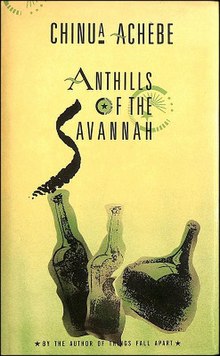Anthills of the Savannah
 From Wikipedia the free encyclopedia
From Wikipedia the free encyclopedia
 First edition cover | |
| Author | Chinua Achebe |
|---|---|
| Language | English |
| Genre | Literary Fiction |
| Set in | Kangan (fictional country) |
| Publisher | Heinemann |
Publication date | 1987 |
| Media type | |
| ISBN | 978-0-385-26045-9 |
| OCLC | 19932181 |
| Preceded by | A Man of the People |
| Followed by | There was a Country: A Personal History of Biafra |
Anthills of the Savannah is a 1987 novel by Nigerian writer Chinua Achebe. It was his fifth novel, first published in the United Kingdom 21 years after Achebe's previous one (A Man of the People in 1966), and was credited with having "revived his reputation in Britain".[1] A finalist for the 1987 Booker Prize for Fiction, Anthills of the Savannah has been described as the "most important novel to come out of Africa in the [1980s]".[2] Critics praised the novel upon its release.
Plot
[edit]The plot centres around the political intrigue in an imaginary West African country of Kangan, where a Sandhurst-trained officer, identified only as Sam and known as "His Excellency", has taken power following a military coup. Achebe describes the political situation through the experiences of three friends: Chris Oriko, the government's Commissioner for Information; Beatrice Okoh, an official in the Ministry of Finance and girlfriend of Chris; and Ikem Osodi, a newspaper editor critical of the regime. Other characters include Elewa, Ikem's girlfriend, and Major "Samsonite" Ossai, a military official known for stapling hands with a Samsonite stapler. Tensions escalate throughout the novel, culminating in the assassination of Ikem by the regime, the toppling and death of Sam, and finally the murder of Chris. The book ends with a non-traditional naming ceremony for Elewa and Ikem's month-old daughter, organized by Beatrice.
Reception
[edit]The novel was well-received by critics. Charles Johnson, writing for The Washington Post, praised the book but faulted Achebe for failing to fully flesh out his characters.[3] Nadine Gordimer praised the book's humour, particularly when contrasted against its depictions of horrors.[4] Ben Okri described it in The Observer as Achebe's "most complex and his wisest book to date".[5]
References
[edit]- ^ Jaggi, Maya (18 November 2000), "Storyteller of the savannah", The Guardian.
- ^ Ehling, Holger G. (1991). Critical Approaches to Anthills of the Savannah. The Netherlands: Rodopi. 1.
- ^ Johnson, Charles (7 February 1988). "'Anthills of the Savannah' by Chinua Achebe". The Washington Post. Retrieved 18 October 2016.
- ^ Gordimer, Nadine (21 February 1988). "A TYRANNY OF CLOWNS". The New York Times. Retrieved 18 October 2016.
- ^ Cited in Boehmer, Elleke (1990), "Of Goddesses and Stories: Gender and a New Politics in Achebe's Anthills of the Savannah", Kunapipi, Vol. 12, Issue 2, p. 102.
External links
[edit]- D. A. N. Jones, "Powerful People" (review), London Review of Books, Vol. 9, No. 18, 15 October 1987, pp. 24–25.
- Charles Johnson, "‘Anthills of the Savannah’ by Chinua Achebe" (review), The Washington Post, 22 March 2013; reprinted from 7 February 1988.